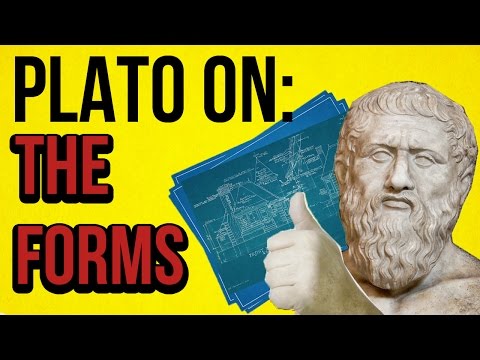Asking one's self and others what the perfect version of something is the ideal version might sound like a strange idea
问一个人自己或者别人什么样才是某物的完美的形式、理想的形式可能听上去有点奇怪
What is the perfect marriage? Or career? Or system of government? Or school?
什么样才是完美的婚姻?或职业生涯?或政府系统?或学校?
It can feel immature and naïve to bother much with such questions they're just daydreams.
似乎为这些问题困扰会显得幼稚,只是白日梦罢了。
After all: who cares about ideal versions? We might as well deal with what we've got.
毕竟谁在乎所谓理想的形式呢?我们关注现有的东西就好了。
But the great ancient Greek philosopher Plato strenuously disagrees with this.
但伟大的古希腊哲学家柏拉图对此表示坚决的反对。

Throughout his work, he argues that focusing on the ideal version of something is one of the most useful kinds of thought excercises we can generate
在他的著作中,他争辩道:关注某物的理想形式,是我们所能进行的思维活动中最有价值的种类之一。
it's by knowing how something should be like that we can more clearly start to define what might be wrong
通过了解某物“应该”是什么样子的,我们可以更清楚地开始定义什么是错误的
and focus on what we need to do to make the world slightly better
而注重于我们所需要做的,使世界稍微变得更好。
When he was talking about ideals,
当柏拉图谈理想形式的时候,
Plato used a slightly strange but ultimately useful word: THE FORMS
他用了一个稍显特殊但其实很有意义的词:“形”
So he asks not what is the *ideal* friendship or the *ideal* kind of parental love
所以他不会问“什么是友谊的理想形式”或“什么是父母对子女之爱的理想形式”
He asks what is the form of friendship, or the form of parental love.
而是问“什么是友谊的‘形’”、“什么是父母对子女之爱的‘形’”
It does sound strange
听上去确实有点奇怪,
But what he had in mind was something very practical:
但他的本意非常联系实际的:
When a Greek stonemason was carving an ornament, they wouldn't just make it up themselves.
当希腊石匠制作装饰雕像时,他们并不是凭空制造,
They'd make use of a wooden template, or form, to check if they were getting it right.
他们会利用一个木制样板,也就是‘形’,来检验所雕是否符合规范
The form itself was made by the master
‘形’本身为雕塑大师所作,
But if the mason posesed the form, they could more reliably do perfect work.
而如果普通的石匠有了这个‘形’,他们就能更加准确地雕出完美的作品。
This is Plato's basic picture of what an ideal is:
这就是柏拉图对于理想形式是什么的想法基础:
It's the guide you need that shows you how to do something well yourself.
它是指导你如何自己把某事做好的典范
If you've got posession of the form, you can be guided towards a true goal.
一旦你拥有了‘形’,你就可以按指导达到真正的目标。
A form, as Plato sees it, is a blueprint a set of instructions for making a very good version of something.
‘形’在柏拉图看来即是一种蓝图,一套用以正确制造某物的指南方法
That's why we all need a very well thought-through set of forms to guide us in life.
这就是为什么我们都需要一套经过深思熟虑的‘形’来指导我们生活。
And, unsurprinsingly, it is philosophy that can guide us to these forms.
而不足为奇的是,能让我们得到这些‘形’的正是哲学。
So, for example, the form of friendship is a mental model of what a really good friendship actually involves.
所以,举个例子来说,友谊的‘形’是一个抽象的模型,用以包括所谓真正的友谊所需要的因素
And if you grasp this model, if this idea is active in your mind, you will know how to be a good friend.
而如果你明白了这个模型,如果这个概念在你的脑海里激活,你就会知道应该怎样去做一个真正的朋友。
Similarly, having a form of education in mind is going to be very usefull for the teacher
同样地,在脑海中拥有教育的‘形’,会对一位老师很有用,
It will stop her being buffeted by events and day-to-day pressures she'll be able to keep in mind where, ideally, she should be going.
它能使其从日常的教学压力与琐碎中解脱出来,在心里记住按照最理想的方式应该朝什么方向
We've typically thought of ideals as phantasy projections that blindly ignore most of what life is actually like.
我们通常觉得‘理想形式’的概念是空投幻想,会使我们盲目忽视大多数现实生活的样子
We think of them as the opposite of being realistic.
我们把它们看作是实事求是的对立面,
But Plato sees an ideal as a result of a deep understanding, and careful engagement with reality
然而柏拉图认为理想形式是深思熟虑严谨结合现实的结果,
Someone setting up an airport would need, in the platonic scheme, to have in mind the ideal air traffic control system.
在柏拉图式思维体系中,建机场的人需要在脑海中,先有理想的航空交通管理系统,
Something optimally effective, efficient and safe.
最为优化实用、有效、安全的那种。
This is the person who would, in Plato's terms, have grasped the form of air traffic control.
这就需要那个人,如柏拉图言,明白航空交通管理的‘形’是怎样的。
We all need to have as many forms in mind as we possibly can.
我们都需要尽可能多地在自己脑海中拥有事物的‘形’。
Plato is breaking the habitualistic assumption that searching for the ideal is at odds with getting things done in the ruff and tumble of the real world.
柏拉图打破了惯性思维的假设,即追求理想形式不利于务实、在这个充满混乱的现实社会中完成任务的,
And he's pushing us to be more exacting about where we are trying to head to.
他要求我们想清楚我们尝试达到的目标究竟是怎样的,
If an ideal seems utterly distant and hopeless, maybe the problem isn't that it's too idealistic,
如果某物的‘形’看起来遥不可及,可能问题不是在于它太过理想化了,
but in a strange, but important, way actually not idealistic enough.
而在奇怪而重要的意义上来说,恰恰相反,在于它还不够真正的理想。
That is, we have not quite yet discovered the form.
也就是说,我们并没有认识真正的‘形’
We shouldn't abandon our ideals, we should get more ambitious about them
我们不应该抛弃理想形式,我们应该变得更加对此有追求,
And Plato's philosophy is on hand to help us.
而柏拉图的哲学是我们手边的上好工具。











